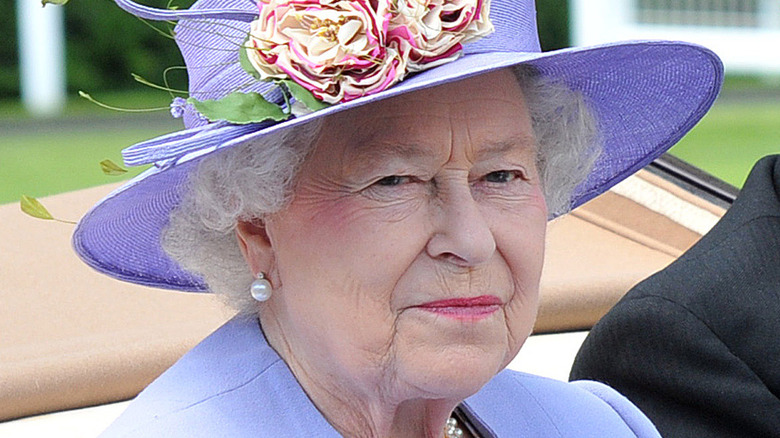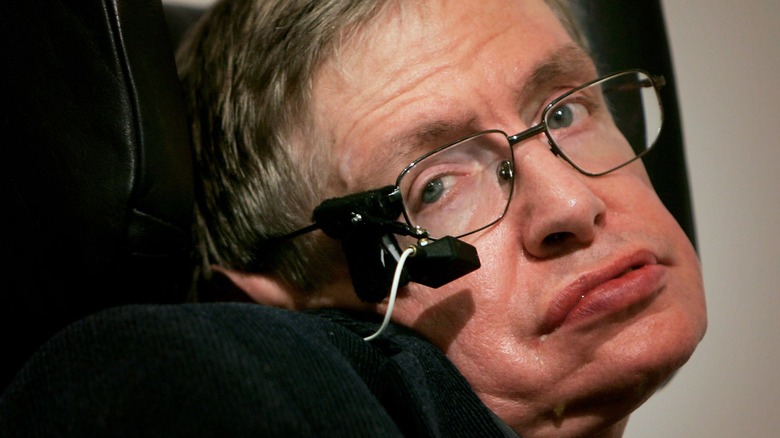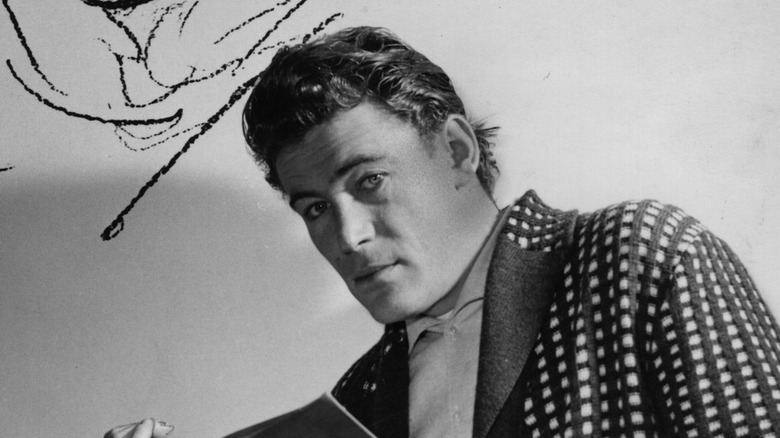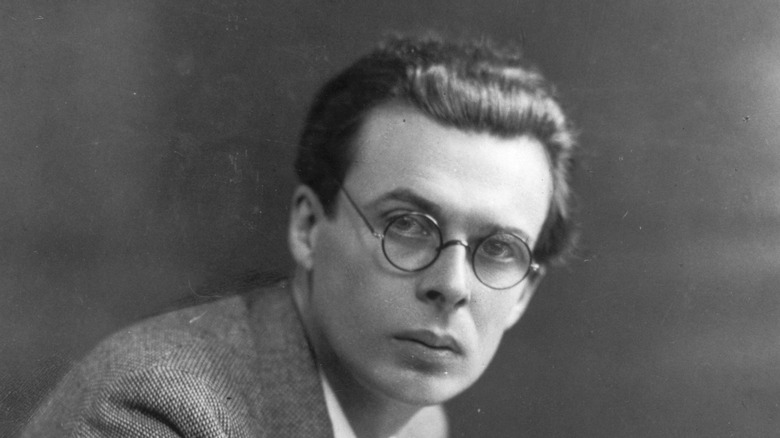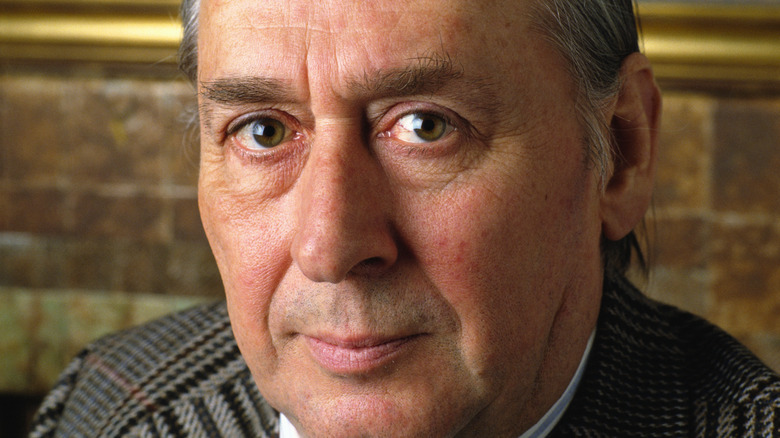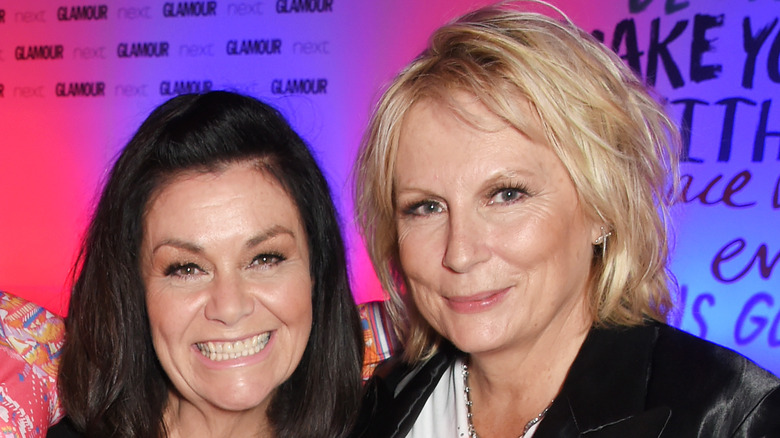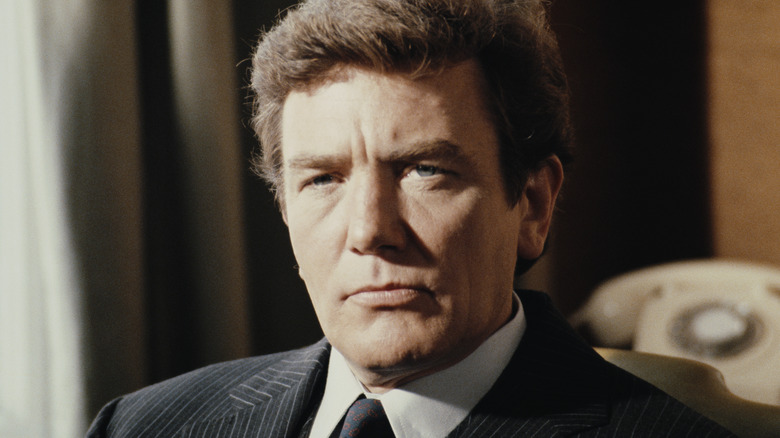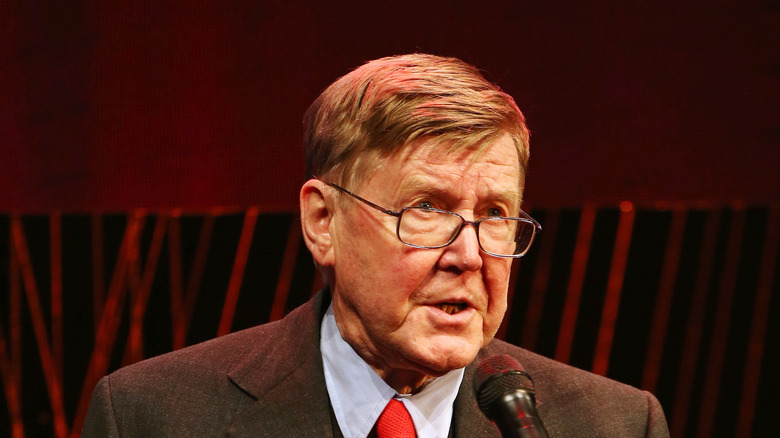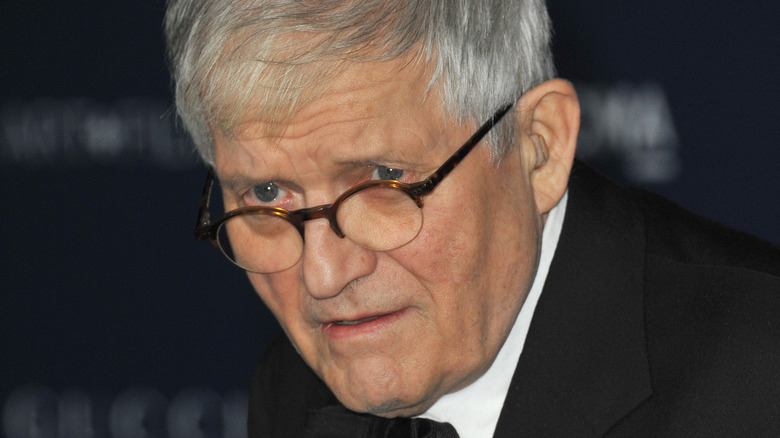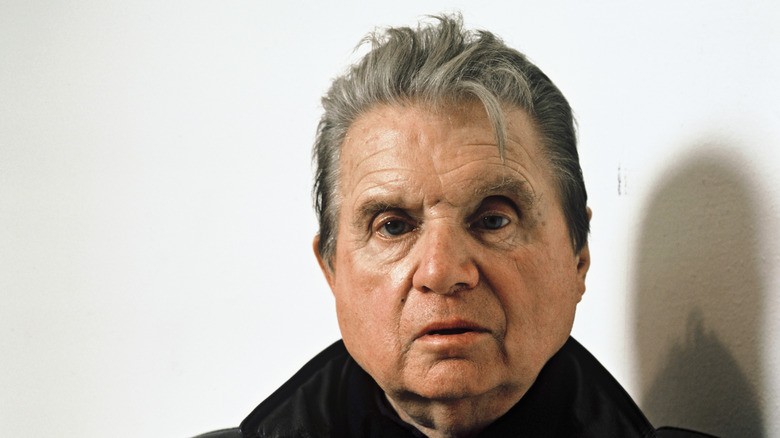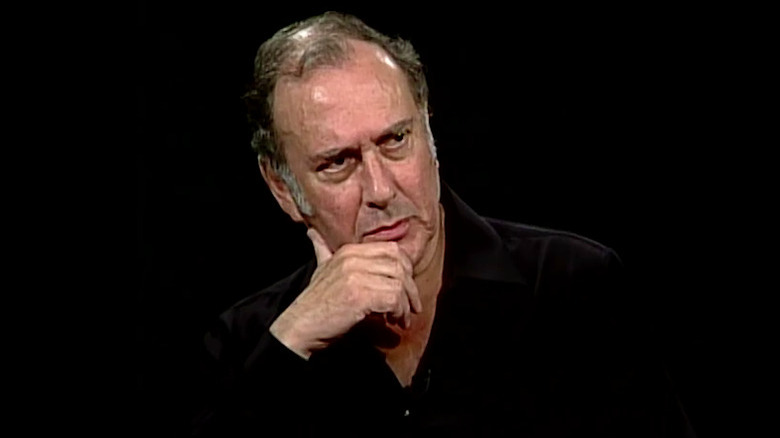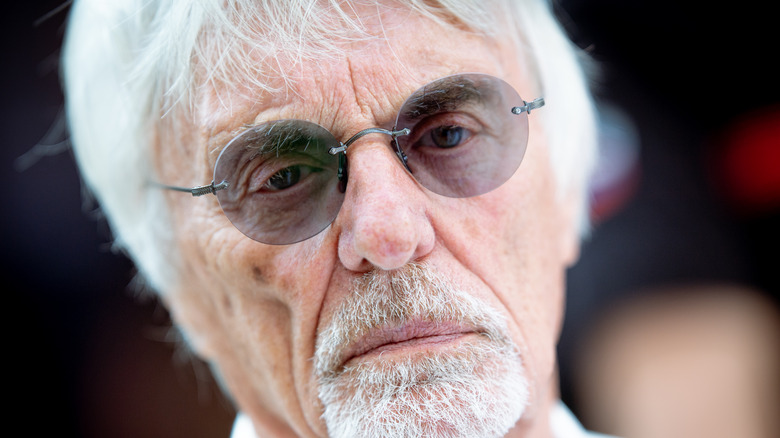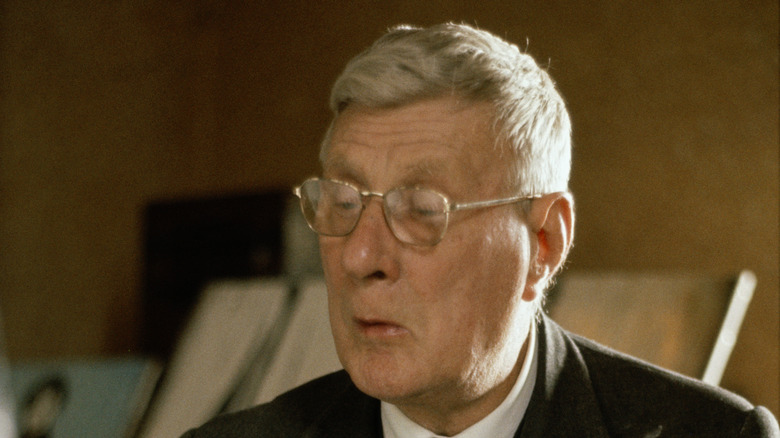Famous People Who Declined Honors From Queen Elizabeth II
The death of Queen Elizabeth II in 2022 was perhaps the highest-profile death of the 21st century so far. Countless tributes were made around the world, from the avenues of Ottawa to the beaches of the Pacific. Individual tributes were just as disparate, too. For example, leaders from Western Europe and North America were joined in their collective praise by global pariah Vladimir Putin who described her majesty's death as a "heavy, irreparable loss." After 10 days of national mourning, Elizabeth II's funeral was viewed by some 4 billion people (via Deadline).
It is clear, then, that Queen Elizabeth II commanded respect from almost every corner of the international stage. Yet not everyone towed the royal line during her 70-year reign. According to the Cabinet Office, at least 277 people rejected the royal honors system, refusing OBEs, MBEs, CBEs, and knighthoods, which are issued in the annual New Year and Birthday Honours lists. The reasons for this vary. Some had strong republican views, meaning they wanted Great Britain to be a republic rather than a monarchy. Others simply felt incompatible with the royal customs and formality.
Whatever their reasons, here is a cross-section of famous people who declined honors from Queen Elizabeth II.
Stephen Hawking
According to iNews, Stephen Hawking turned down a knighthood in the late 1990s. He did so because he opposed the British government's management of scientific institutions, namely the merger of the Particle Physics and Astronomy Research Council and the Council for the Central Laboratory of the Research Councils.
Hawking accepted plenty of other British honors earlier in his life, though. In 1989, he accepted the Order of the Companion of Honour (CH), which honors those who have made "a major contribution to the arts, science, medicine, or government lasting over a long period of time." He also earned a Commander of the Most Excellent Order of the British Empire (CBE) in 1982.
In 2009, some 10 years after Hawking rejected a knighthood, President Barack Obama awarded Hawking with the Presidential Medal of Freedom, the highest civilian award in the United States. "He has become one of the world's leading scientists," Obama said, praising Hawking's resolve in living with motor neuron disease, "He has stirred our imagination and shown us the power of the human spirit here on Earth."
Peter O'Toole
Renowned for his turn in "Lawrence of Arabia," Peter O'Toole refused a knighthood in the 1980s, citing his opposition to Margaret Thatcher (via Time). O'Toole had always been a staunch Labour supporter. According to obituarist John Lund, O'Toole attempted to "bully" friends and family into voting for Labour but reconsidered his methods when his personal driver confessed to voting Conservative, citing the Labour government's high taxes.
It is doubtful that O'Toole ever paid much mind to the prospect of a knighthood; he was too busy being nominated for Academy Awards. From 1962 to 2006, O'Toole was nominated eight times for Best Actor in a Leading Role, losing all of them (via EW). In 2003, the actor received an honorary Oscar after having initially refused it. According to The Irish Examiner, O'Toole thought the gesture represented a premature retirement. However, upon reflection, he changed his mind and took to the stage, quipping, "Always a bridesmaid, never a bride, my foot!"
Aldous Huxley
Writer Aldous Huxley is remembered chiefly for his 1932 novel "Brave New World," which is among the foremost novels in the dystopian canon. Huxley's book imagines a nefarious world government that employs advanced technology and psychological manipulation to subdue its people and create a rigid class system. Given Huxley's distrust of establishment forces, it is perhaps unsurprising that the author refused a knighthood in the New Year Honours List of 1959 (via the Cabinet Office).
Huxley spent much of his life in California, where he lived with his wife Maria and their son Matthew. He wrote numerous books, essays, and scripts during his time in America, including "The Doors of Perception" and "Heaven and Hell," which were controversial accounts of LSD and mescaline use (via The Guardian). These psychedelic experiences changed his perspective on life. "We are multiple amphibians living in many different – even in some senses incommensurable – universes at the same time," Huxley remarked in an interview, "our business in life is somehow to make the best of all the worlds we live in." One wonders what Queen Elizabeth II would have made of such a sentiment.
J. G. Ballard
J. G. Ballard is best known as the author of novels such as "Empire of the Sun" and "Crash." And being a writer, he did not mince words when he was offered a CBE in 2003. Per The Guardian, Ballard rather poetically, if rudely, described the British monarchy as "a huge pantomime where tinsel takes the place of substance," adding that he couldn't stand "all that bowing and scraping and mummery at the palace."
While Ballard was open to other awards, such as France's Legion d'Honneur, it seems his strong republican views prevented him from accepting any monarchical awards. Ballard also took aim at other recipients of the honors system, saying, "I think it's deplorable when leftwing playwrights like David Hare, who have worn their socialist colors on both sleeves for so many years, should accept a knighthood. God almighty, this man actually knelt down in front of the Queen" (via Melville House).
Dawn French and Jennifer Saunders
Comedy duo Dawn French and Jennifer Saunders felt uncomfortable when they were offered OBEs in 2001. Saunders felt that her contribution to "comedy-drama" did not warrant such an accolade, especially compared to her father, Robert, who was awarded a CBE for his pilotry in the RAF. "He worked really hard, and he was a brilliant man, and he did an awful lot," Saunders told Best magazine (via Yahoo! News), "but we just jumped up on stage, messed about, and made money.'" Saunders later added that she would have felt "fake" standing alongside other recipients, especially those who worked in charitable endeavors or the National Health Service.
Those close French and Saunders have made different choices, though. Joanna Lumley, Saunders' other comedy partner, accepted a damehood in 2022, while Lenny Henry, French's ex-husband, received a knighthood in 2015 (via ITV and the BBC). Both were delighted by the honor, especially Lumley, who described the damehood as a "most beautiful present."
Albert Finney
Actor Albert Finney emerged during the "Angry Young Men" cultural movement of the late 1950s and early 1960s (via Britannica). Led by writers such as John Wain, Alan Sillitoe, and John Osborne, the "Angry Young Men" period, which is also referred to as kitchen sink realism, told stories of working or middle-class characters with a cynical view of society and the British class system. Finney made his mark on this oeuvre with the 1960 film "Saturday Night, Sunday Morning," in which he played Arthur, a young machinist with an appetite for bad behavior.
Finney's winning performance led to a Hollywood career of some 60 years, with roles in "Tom Jones," "Murder on the Orient Express," and "Erin Brockovich." Fame and wealth didn't change the working class lad from Salford, though. When Finney was offered a knighthood in 2000, he rejected it outright and criticized the honors system as a means of "perpetuating snobbery" (via The New York Times).
Alan Bennett
Playwright Alan Bennett has described himself, per the BBC, as Britain's "last monarchist," explaining, "I simply can't imagine if we had anything in its place, it would be anything but worse." He also spoke fondly of then-Prince Charles, praising his conscientious work ethic. "I have a great deal of time for him," Bennett said, "he really works his a** off." However, despite his reverence, Bennett rejected a knighthood in 1996. "It would be like wearing a suit every day of your life," he said, addressing a Hay Festival audience.
Still, despite the snub, Bennett has a longstanding interest and respect for the royal family. His 2007 novella "The Uncommon Reader" imagines Queen Elizabeth II as an avid bookworm, lightly mocking her majesty with what The Guardian described as "beautifully modulated jokes." As with King Charles III, Bennett had no ill will towards the late queen, saying, "She is a very good person to write about, in the sense that you know exactly how she speaks."
David Hockney
British artist David Hockney refused a knighthood in 1990, with his reasoning being that he "does not care for fuss" and that he valued friends over prizes (via the BBC). "I do not think life is about prizes," Hockney told the Telegraph and Argus, "I put them all in the bottom drawer and leave them there ... prizes of any sort are a bit suspect." Despite this view on accolades, Hockney nonetheless joined the Order of Merit as part of the Queen's New Year Honours list in 2012.
Like the playwright Alan Bennett, Hockney's refusal did not have to do with any kind of strong republican sentiment. His creativity is also inspired by the queen, who he described as a "terrific subject" for a potential painting. That never happened, for many reasons, including that Hockney only paints those he knows. The queen might not have been happy with the result anyway, as he says he is not a "flatterer."
Francis Bacon
The artist Francis Bacon was not one for pomp and circumstance. "When I'm dead, put me in a plastic bag and throw me in the gutter," he told the owner of Colony Room, his favorite Soho watering hole (via The Guardian). Anyone who has reflected on his strange and sometimes disturbing paintings can see this attitude reflected back at them.
Bacon reportedly cared little for most things in life, including his reputation. The gifted artist dismissed talk of his legacy as "rubbish" and never got on with the art establishment. He didn't bother with formal training, either.
Still, despite his many snubs, the queen attempted to reward Bacon with a CBE 1960 (via the Cabinet Office). Naturally, he declined. "They're so aging," he quipped to a friend. Incidentally, Bacon is said to have booed Princess Margaret, the notorious hedonist, when she inflicted her singing voice on him at a party.
Harold Pinter
Playwright Harold Pinter accepted a CBE in 1966 but later refused a knighthood from Prime Minister John Major in the 1990s. Pinter described knighthoods as "squalid" and thought being called "sir" was "silly" (via The Guardian). Even later, in 2002, Pinter accepted a Companions of Honour (CH), a decision that came after some deliberation. "However critical I might or might not be about this country, nevertheless, a) I like cricket, and b) I do live in this country," said Pinter. He also viewed the CH as an honor from the U.K. more generally rather than one bestowed by the monarchy.
Like other famous writers, Pinter accepted the Légion d'honneur, which the French Republic awarded him in 2007, about a year before his death on December 24, 2008. It seems that the Légion d'honneur is simply cooler than anything the British monarchy can muster. It is considered a premier award from a country associated with highbrow culture, while the British honours system is something of an establishment club.
Bernie Ecclestone
Former F1 boss Bernie Ecclestone refused a knighthood in the early 2000s, and he was refreshingly honest about why he did so. "Anything I did, I did for myself," Ecclestone stated in an interview with sports journalist Graham Bensinger. He continued, "If England benefitted, good. I didn't go out particularly to do that."
The businessman has also said that didn't think many people who are knighted now "really deserve it," including Formula One star Lewis Hamilton, who was knighted by then-Prince Charles at Windsor Castle in December 2021, just days after losing to Max Verstappen (via Autoweek/GrandPX). It was Hamilton's second honor, having received an MBE in 2008 after winning his first Formula One championship (via BBC).
When asked about the seven-time champion's knighthood, Ecclestone said that "only people who have really done something for the country should be knighted ... they all make a lot of money and donate some to charity, but they haven't done anything specific for the country."
L. S. Lowry
Born in Salford near Manchester, L. S. Lowry was an artist celebrated for his paintings of industrial landscapes in the north of England. Lowry turned down five honors in his life, including a knighthood in 1968. Lowry's interest in working-class life may suggest socialist principles and a subsequent contempt for the monarchy, but this was not the case. According to his friend Harold Riley, Lowry did not have "anything against the system" (via BBC). Instead, Lowry simply felt uncomfortable with such grandiosity. "He indicated that he didn't wish to change his situation by something being latched on to him," Riley said. "[Changing] your status in the eyes of the public, well, that wouldn't have suited him."
Like other writers and artists, Lowry was open to the Companions of Honour. However, the artist would still turn down the honor twice, once in 1972 and again in 1976. In fact, Lowry was so determined not to "change his situation" that he became the most prolific refuser of honors in British history.
